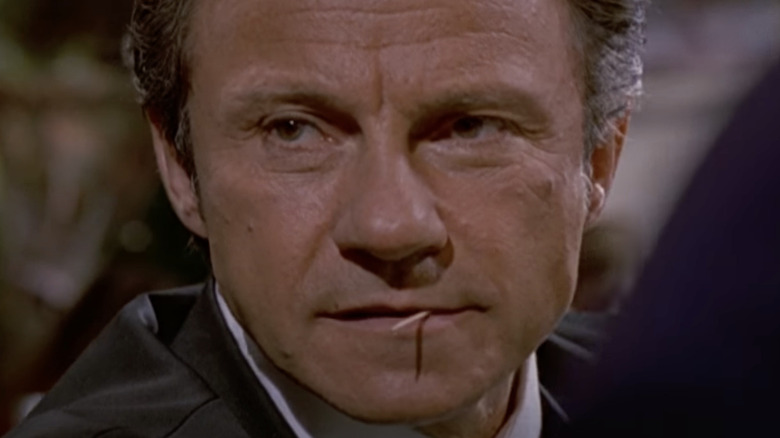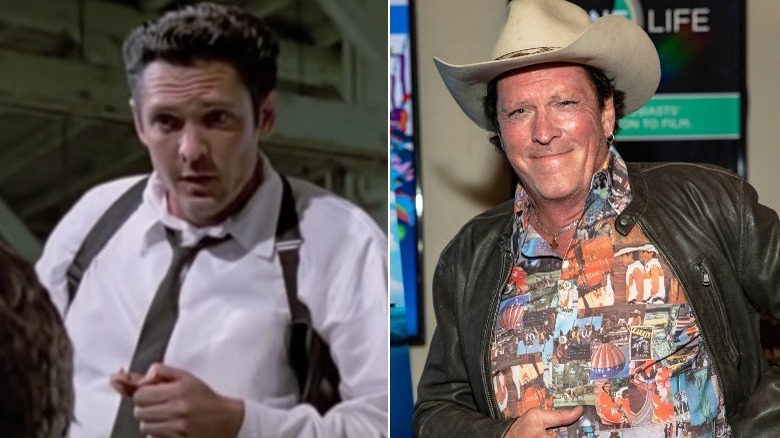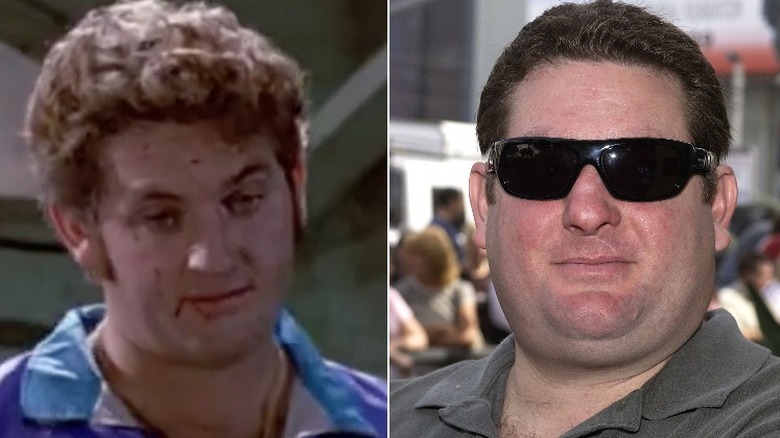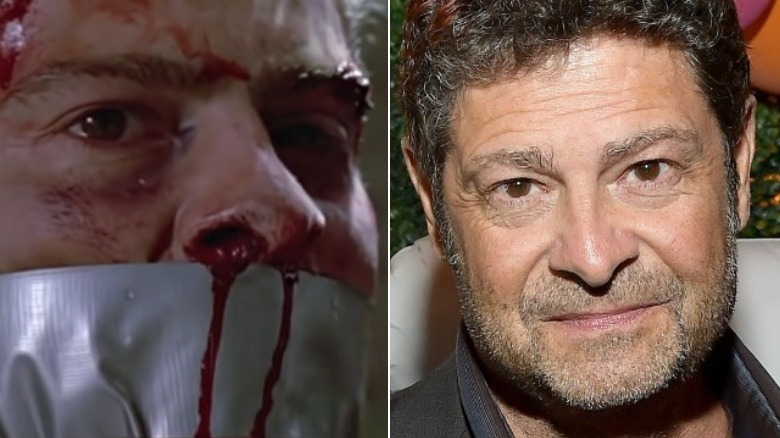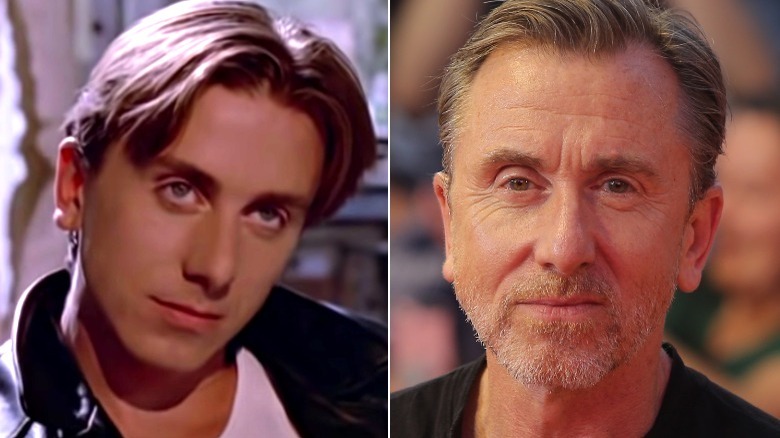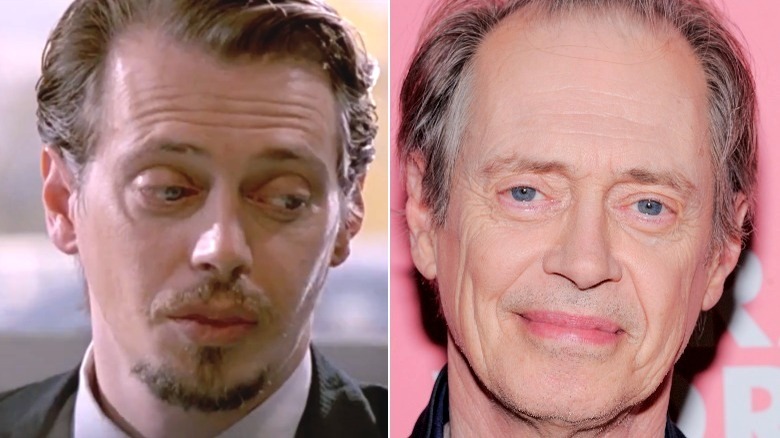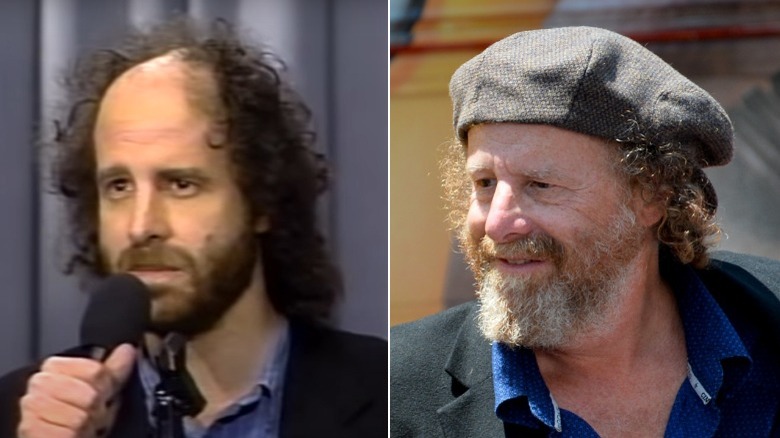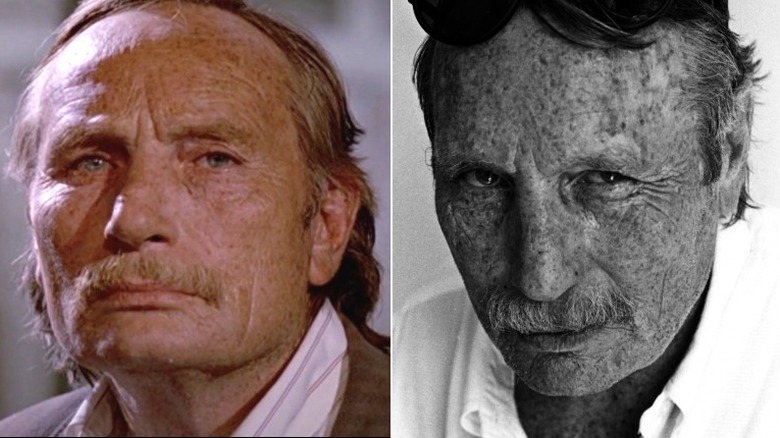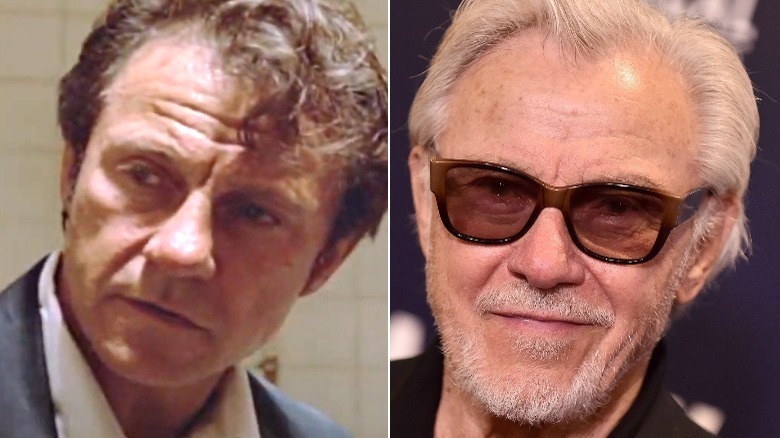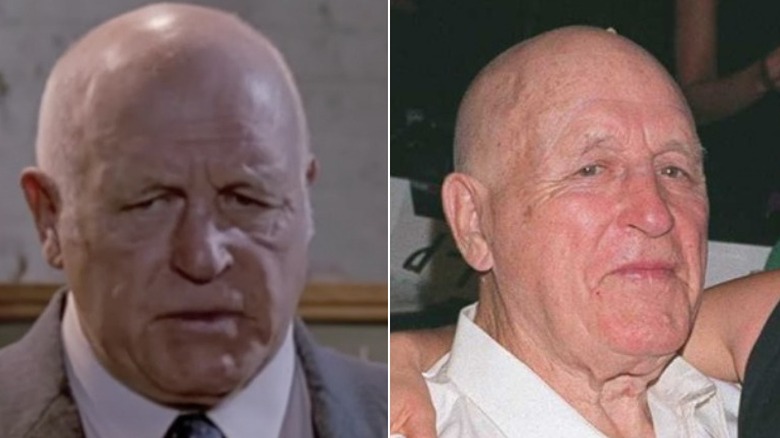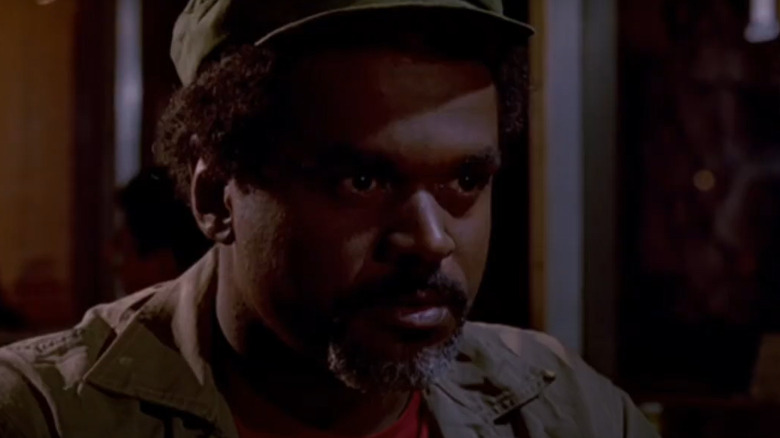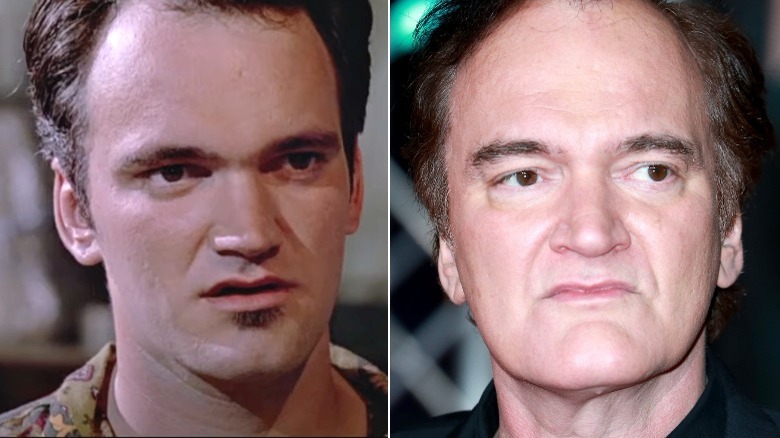What The Cast Of Reservoir Dogs Looks Like Today
"Reservoir Dogs" exploded onto screens 30 years ago in a splatter pattern of profanity, flying bullets, and loquacious thugs. To say it had an impact is a major understatement. The directorial debut of a former Manhattan Beach, California video store clerk Quentin Tarantino, the film set Sundance alight and bolstered the era's revolution in independent film. But "Reservoir" was different. Allegedly written in three and a half weeks, and shot for just over $1 million, it's a crime film — a classic heist-gone-wrong scenario that turns the formula on its head. The killers aren't nameless, faceless goons. They each have a story to tell, and they talk; boy, do they ever talk; about things like Madonna, Blaxploitation films, tipping, colors, and, of course, K-Billy's Super Sounds of the '70s.
The stories of the cast of "Reservoir Dogs" are almost as fascinating as the film itself. Several went on to prolific careers in film and TV. Some careers petered out. Some passed away. And one went on to become one of Hollywood's most celebrated and controversial directors. The film's influence continues to be felt, and not just in crime and action films. The title of Taika Waititi and Sterlin Harjo's series "Reservation Dogs" directly recalls this film.
Michael Madsen
In the video interview released as part of the film's 10th anniversary DVD, Michael Madsen muses on the nature of cool. "It's not an actable thing," he says. "You either have it or you don't." Cool, Madsen theorized, was Robert Mitchum, Burt Lancaster, and, of course, Lee Marvin, of whom Madsen's character, Vic Vega (aka Mr. Blonde) suspects Joe of being a fan. Madsen mesmerizes in one of the film's more infamous scenes, dancing around the thugs' warehouse to the strains of Stealers Wheel's "Stuck in the Middle with You." It would not be the last time Madsen and Tarantino worked together; Madsen appeared again in Tarantino's "Kill Bill: Vol. 2" and "The Hateful Eight." There was, apparently, some talk about a Vega brothers movie, featuring Madsen and John Travolta reprising his "Pulp Fiction" role as Vincent Vega, but it never materialized.
Having played roles in films as far-flung as "Donnie Brasco," "Sin City," "Free Willy," "Wyatt Earp," and probably nobody's favorite James Bond film "Die Another Day," Madsen continues to act regularly. In case things slow down, he's always got his line of hot sauces to fall back on.
Chris Penn
The youngest of the three Penn brothers (Sean and Michael were his older siblings), Chris Penn left behind an impressive slate of films that ran the gamut from crime to comedy. His career kicked off with memorable appearances in "Rumble Fish," "All the Right Moves," "Footloose," and "At Close Range" (alongside Sean Penn and his mother Eileen Ryan). That's when Penn crossed paths with Tarantino, who cast him as Joe Cabot's son "Nice Guy" Eddie in "Reservoir Dogs." Penn also played the character Nicky Dimes in the Tarantino-penned "True Romance." Penn worked consistently throughout the '90s and early '00s, gaining accolades for his hapless pool cleaner in Robert Altman's "Short Cuts," a gangster in Abel Ferrara's "The Funeral" (for which he was named best supporting actor at the Venice Film Festival), and a cop in "To Wong Foo, Thanks for Everything! Julie Newmar." Subsequent roles saw Penn cast as detectives, criminals, or down-on-their-luck sad sacks, with his last major role being in the short-lived series "The Brotherhood of Poland, New Hampshire," with Randy Quaid and John Carroll Lynch. Sadly, Penn was found dead in his apartment in January 2006 at the age of 40, apparently the result of heart disease.
Kirk Baltz
In "Reservoir Dogs," Kirk Baltz played Marvin Nash, the cop menaced by Mr. Blonde in what may be one of Quentin Tarantino's most infamous scenes. To prepare for the role, according to Baltz in an interview released with the 10th anniversary DVD, he asked Michael Madsen if he could ride around in the trunk of Madsen's Coup de Ville. Madsen was up for it and wound up taking Baltz for a much longer ride than he expected. Madsen, in his own interview, claims he took a detour down a long alley with numerous potholes, then stopped at a Taco Bell drive-through. By now Baltz was banging on the car and crying out for Madsen to stop; in order to avoid attention, Madsen simply turned up the music to drown out Baltz's screams.
In his interview, Baltz had nothing but praise for Madsen, claiming the two developed enough on-set trust that he allowed Madsen to slap him for real, lending a good deal of verisimilitude to their scene. That's not all that occurs in that scene, but we won't spoil the surprise.
Baltz never parlayed his "Reservoir" experience into greater fame, but he continues to work, having played recurring roles in "NYPD Blue," the short-lived series "Human Target" and "Wicked City," and appeared in the late '90s films "Face/Off," and "Bulworth."
Tim Roth
By 1991, Tim Roth was firmly established as a British actor willing to take chances. A member of the so-called "Brit Pack," his roles in Robert Altman's "Vincent & Theo," Peter Greenaway's "The Cook, the Thief, His Wife, and Her Lover," and "Rosencrantz and Guildenstern Are Dead" alongside Gary Oldman. Roth was also nominated for a BAFTA for most promising newcomer in 1985, putting him squarely in Tarantino's sights. While Roth was originally up for the roles of Mr. Blonde and Mr. Pink, Roth preferred the complexity of Freddy, the cop who prepares intensely to gain the trust of Joe Cabot and is given the moniker Mr. Orange. His bravura performance is all the more remarkable given he's lying in a puddle of blood for most of the film.
Roth's star would continue to ascend after "Dogs," working with Tarantino again in the anthology film "Four Rooms," "Pulp Fiction," and "The Hateful Eight." He earned Oscar and Golden Globe nominations and the BAFTA Award for his supporting role in 1995's "Rob Roy," and has worked with more of the industry's most acclaimed directors: Francis Ford Coppola in "Youth Without Youth," Michael Haneke in "Funny Games," Ava DuVernay in "Selma," and David Lynch in "Twin Peaks: The Return." On TV, Roth led the Fox series "Lie to Me" from 2009 to 2011 and reprised his role of Emil Blonsky in "She-Hulk." Roth first played Blonsky, aka the Abomination, in Louis Leterrier's "The Incredible Hulk" 14 years prior.
Steve Buscemi
Time and space won't permit a full accounting of Steve Buscemi's incredible career in film; suffice it to say he was still an indie darling when he was cast in "Reservoir Dogs," having appeared in the Coen Brothers' "Miller's Crossing" and "Barton Fink," Abel Ferrara's "King of New York," and Jim Jarmusch's "Mystery Train," for which he nabbed the first of his five Independent Spirit Award nominations. It was only up from here. Following his role as the twitchy Mr. Pink in "Reservoir Dogs," Buscemi went on to star in the Coen Brothers' "Fargo" and "The Big Lebowski," and kicked off a directing career that's included an adaptation of Eddie Bunker's "Animal Factory." He's had his blockbuster phase with "Con Air" and "Armageddon," his animated phase with "Monsters, Inc." and "Hotel Transylvania" and his turns on television with "The Sopranos," "Boardwalk Empire," "Horace and Pete," and "Miracle Workers."
Despite all the acclaim, Buscemi may be best remembered in his home city for the four years he spent as a firefighter with Engine Company No. 55 in Little Italy. He's done subsequent work with and on behalf of FDNY, particularly in the wake of 9/11, when he returned to his old firehouse to volunteer and worked 12-hour shifts for several days and searched the rubble for missing firefighters. He went on to host the HBO documentary "A Good Job: Stories of the FDNY."
Steven Wright
Steven Wright's face doesn't appear in "Reservoir Dogs." But his presence is felt throughout on account of his character, radio DJ K-Billy, who spins "Super Sounds of the '70s" throughout the action. Fans of Steven Wright at the time instantly recognized his voice and understood the irony of his laidback persona emerging in this decisively not laidback story. Wright's comic persona is that of a disinterested, non-sequitur-spewing, spaced-out weirdo, and true to form, K-Billy sounds like he couldn't care less about his job. No matter whether he's talking about Stealers Wheel, Edison Lighthouse, Bo Donaldson and the Heywoods, or giving away tickets to a monster truck competition, the DJ sounds like he's about to nod off.
Wright came to Tarantino's attention via the late Sally Menke, editor on all of Tarantino's films through "Inglorious Basterds," who was married to director Dean Parisot. As Wright's standup career was taking off, he collaborated with Parisot on a short film, "The Appointments of Dennis Jennings," which wound up winning the 1989 Oscar for best live action short. After "Reservoir," Wright played roles in "Mad About You," and was nominated for two Primetime Emmys for his role as a producer of the ill-fated sitcom "Louie." In 2008, the Cambridge, Mass., native became the first inductee to the Boston Comedy Hall of Fame, and in 2017, Wright was named one of the 50 best standup comics of all time by Rolling Stone.
Eddie Bunker
Edward "Eddie" Bunker lived a heck of a life, and it showed. Years of family pain, prison brutality, and run-ins with the law are etched all over his face in "Reservoir Dogs." But his experience behind bars came with plenty of time to read and write, and by the time Bunker was released from his last jail stint in 1975, he had published "No Beast So Fierce," the novel that became the source of the 1975 Dustin Hoffman film "Straight Time." Tarantino, who had studied "Straight Time" and loved the 1985 film "Runaway Train," for which Bunker co-wrote the screenplay, found Bunker through Chris Penn, who'd known Bunker for years. Penn replays the conversation in his 10th anniversary DVD interview: "Quentin says, 'Do you know him?' I said, 'I'll get him on the phone right now.' And I called Eddie. Quentin said, 'Do you wanna be in this film?', Eddie says 'Yeah,' and that was it." Bunker went on to roles in the Steve Buscemi-directed "Animal Factory," based on Bunker's second novel, and Peter Segal's remake of "The Longest Yard." Bunker died in July 2005 in Burbank, California, at age 71.
Harvey Keitel
Without Harvey Keitel's appreciation for Tarantino's script and his character, the compassionate Mr. White, "Reservoir Dogs" may never have happened. Tarantino told Empire, "Lawrence [Bender] was going to an acting class, and his acting teacher's wife knows Harvey. She gave the script to him and he just called us up three days later and said, 'Look, consider me in. Not only do I want to do it, I want to be one of the producers. I want to help get it made.'" It wasn't Keitel's first rodeo when it came to working with young director — his first feature was Martin Scorsese's debut, "Who's That Knocking at My Door?" Keitel and Scorsese, of course, would form one of film's most durable dyads, with Keitel going on to star in five other Scorsese films, including "The Irishman."
Keitel's admiration for auteur directors continued well after "Reservoir Dogs." He worked with Tarantino again in "Pulp Fiction," with Spike Lee on "Clockers," with Jane Campion on "The Piano" and "Holy Smoke" and became a member of Wes Anderson's "repertory company," appearing in "Moonrise Kingdom," "The Grand Budapest Hotel," and "Isle of Dogs." Known as a fearless actor unafraid to bare body and soul for a role, Keitel has starred in projects both infamous ("Bad Lieutenant") and starry ("Bugsy," for which Keitel received his one and only Oscar nomination). He's slated to star in a "National Treasure" series for Disney+, along with several other projects.
Lawrence Tierney
The stories about Lawrence Tierney are insane. With his deep, gravelly voice, he got his big break in Hollywood playing gangster John Dillinger in 1945. Forty-one years later, his character Joe Cabot would remark in "Reservoir Dogs" that one of his lackeys was "dead as Dillinger." Fitting bookends to a career filled with barroom brawls, arrests, and, thanks to Tierney's love of the bottle, multiple lost opportunities. Tierney went on to play tough guys in films like ”San Quentin,” ”The Devil Thumbs a Ride,” ”Born to Kill” and an Oscars best picture winner "The Greatest Show on Earth." But his career was marred by his tendency to get in trouble, including a 1973 incident in which he was stabbed in a Manhattan bar.
That said, it makes sense that Tarantino, who would go on to revive the careers of actors John Travolta, Pam Grier, and Robert Forster, would cast Tierney as Joe Cabot. Unsurprisingly, the experience was fraught with tension. Of Tierney's time on set, Tarantino told The Guardian, "Tierney was a complete lunatic... he just needed to be sedated. He was personally challenging to every aspect of film-making... And in the last 20 minutes of the first week we had a blow out and got into a fist fight." Tarantino fired Tierney, who went home, fired a shotgun at his nephew, and wound up in prison. Tierney, who continued playing small roles throughout the '90s, passed away in 2002 at the age of 82.
Randy Brooks
By 1992, Frederick Randolph "Randy" Brooks had appeared in dozens of network shows ("One Day at a Time" and "Mork and Mindy" among them) and soap operas, and starred in two major motion pictures directed by iconoclasts: Hal Ashby's "8 Million Ways to Die," with Jeff Bridges, and Dennis Hopper's 1988 film "Colors" opposite Robert Duvall and Sean Penn. His is the only African American role in "Reservoir Dogs," an undercover cop named Holdaway who makes Tim Roth memorize "amusing anecdotes" so he can successfully infiltrate Cabot's gang ("If you ain't a Brando actor, you're a bad actor. And bad acting is bull**** in this job."). After "Reservoir Dogs," Brooks went back to soaps and appeared as Arthur Leeds, a member of the White House press corps, on 20 episodes of "The West Wing." At 72, Brooks is still with us, but has only acted sporadically since 2007.
Quentin Tarantino
In 1992, a geeky, gawky oddball by the name Quentin Tarantino presented his first film at the Sundance Film Festival. It was snapped up by Miramax Films, the beginning of a creative partnership that wrapped in 2015 when The Weinstein Company released "The Hateful Eight." In between, the director built a filmography that has remained relevant and popular for 30 years. Just naming the films, if you're of a certain age, you likely know where you were when you first heard about and saw them: the Palme D'Or and Oscar-winning "Pulp Fiction," "Kill Bill' Vol. 1 and Vol. 2," "Inglorious Basterds," "Once Upon a Time... In Hollywood," and more. He also wrote the screenplays for "True Romance," "Natural Born Killers," and "From Dusk Til Dawn." Though Tarantino takes extended breaks nowadays, there was a time when he was everywhere, and it seemed like everyone, from Tony Scott to Oliver Stone to Robert Rodriguez had their hands on a Tarantino script.
As an actor, Tarantino has acted mainly in films he either wrote or directed, including "Reservoir Dogs," "From Dusk Til Dawn" and "Death Proof." He also had a short arc on the show "Alias" and appeared on Broadway opposite Marisa Tomei in "Wait Until Dark." And while his character, Mr. Brown, dies in "Reservoir Dogs," it's Tarantino's notorious "Like a Virgin" monologue that opens the film.
